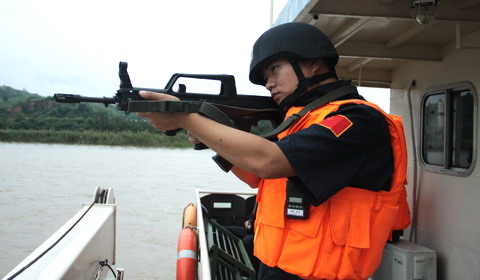China expands research bases in Antarctica
Updated: 2013-12-19 00:57
By WANG QIAN (China Daily)
|
|||||||||||
![Chinese icebreaker Xuelong, or Snow Dragon, arrives at the Zhongshan Station on Dec 2 on the country's 30th expedition to the Antarctica that began on Nov 7. [ZHANG JIANSONG / XINHUA] China expands research bases in Antarctica](../../images/attachement/jpg/site241/20131218/180373cf8432141c3c431a.jpg) |
|
Chinese icebreaker Xuelong, or Snow Dragon, arrives at the Zhongshan Station on Dec 2 on the country's 30th expedition to the Antarctica that began on Nov 7. [ZHANG JIANSONG / XINHUA] |
Building to begin on summer camp, site inspections for another station
China is expanding its presence at the South Pole, with construction workers leaving its Zhongshan Station on Wednesday to build the Taishan summer field camp, the country's fourth Antarctic base.
Site inspections for another research station will also be carried out at Antarctica's Victoria Land during a 155-day expedition launched on Nov 7.
It is China's 30th mission to the continent since 1984.
"As a latecomer to Antarctic scientific research, China is catching up," Qu Tanzhou, director of the State Oceanic Administration's Chinese Arctic and Antarctic Administration, said in an exclusive interview.
| Timeline |
|
• 1983 China signs the Antarctic Treaty. • Nov 20, 1984 The country’s first Antarctic expedition team sets sail, with the first Chinese scientists setting foot on the continent on Dec 26. • Feb 20, 1985 China’s first Antarctic research station — Great Wall — is established on King George Island, with the peak summer population reaching 80 and winter population about 40. • Feb 26, 1989 Zhongshan Station is built on Larsemann Hills in Prydz Bay, East Antarctica, and can accommodate 25 people in winter and 60 in summer. • Jan 27, 2009 China’s first inland station — Kunlun Station — opens at a site about 4,087 meters above sea level and 7.3 km southwest of Dome A, an ice dome on the Antarctic Plateau. • Nov 7, 2013 The country’s 30th Antarctic expedition team sets sail for Antarctica. Building the Taishan summer camp and site inspections for another research station are top priorities. |
China has built three Antarctic research stations — Great Wall, Zhongshan and Kunlun.
"Building the Taishan camp and inspecting sites for the station can further guarantee that Chinese scientists will conduct scientific research over a wider range and in a safer way," Qu said.
He said that with climate change being a common global concern, the nation's scientists are striving to find answers in Antarctica.
The Taishan camp will be used from December to March and construction of the main building is expected to be completed next year. Construction will take about 40 days.
Located between the Zhongshan and Kunlun stations, the base will provide logistical support, Qu said.
Wang Yong, director of science programs for the Chinese Arctic and Antarctic Administration, said the base will also be used to study geology, glaciers, geomagnetism and atmospheric science.
Liu Shunlin, leader of the country's latest Antarctic expedition, said at a news conference in November that the Taishan camp will be built at Princess Elizabeth Land, 2,621 meters above sea level.
It will provide crucial support for scientific research at the Kunlun Station, 4,087 meters above sea level.
The camp will be about 715 km from the Kunlun Station, China's first and only inland base in Antarctica so far, and about 520 km from the Zhongshan Station.
Qu said, "With the camp built, Antarctic explorers and scientists can relieve altitude sickness and have a place to rest before going to the Kunlun Station."
Near Kunlun Station, the ice will help scientists assess climate change over the past 1.5 million years.
A design released by the Chinese Arctic and Antarctic Administration shows the construction area for the camp will cover about 1,000 square meters. It will house up to 20 people, and the main building will be shaped like a Chinese lantern.
Qu added, "When built, the camp will be a logistics hub for personnel and materials such as oil and equipment, expanding the research range."
The new research station will provide a base for research on bio-ecology and remote satellite sensing, the State Oceanic Administration said.
It will be near the United States' McMurdo Station, Italy's Zucchelli Station and a recently built South Korean station.
"International cooperation is important in Antarctic exploration," Qu said.
Among the 256 crew members, two Thai scientists are taking part in China's 30th Antarctic expedition.
While the nation is expanding its presence in Antarctica, it is also enhancing its scientific research ability, with a new icebreaker to be built and a fixed-wing aircraft to be bought for future polar expeditions.
wangqian@chinadaily.com.cn
Related Stories
China's research stations in the Antarctic 2013-12-18 17:45
Antarctica at last 2013-12-04 14:52
Icebreaker Xuelong encounters iceberg 2013-11-29 08:39
Chinese boat on fire in Antarctic, 97 rescued 2013-04-18 10:56
China's 'Xuelong' returns from Antarctic trip 2013-04-09 21:29
Chinese Antarctic team returns to N Hemisphere 2013-03-31 21:01
Today's Top News
Twin goals drive subway fare rise
More protection for Sanjiangyuan
Monaco and Shanghai jointly to grow yachting biz
Vast deposits of 'flammable ice' found
System for organ donors test
Hukou reforms target 2020: official
Russia to bail out Ukraine for $15 billion
Merkel sworn in for a third term
Hot Topics
Lunar probe , China growth forecasts, Emission rules get tougher, China seen through 'colored lens', International board,
Editor's Picks

|

|

|

|

|

|





